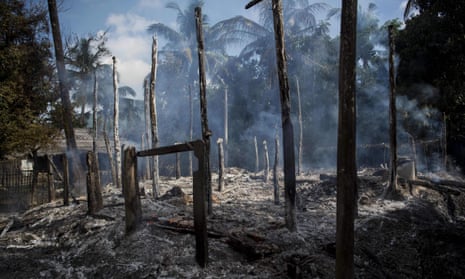A journalist who worked at the English-language Myanmar Times has said she was dismissed for an article she wrote on allegations of rape by security forces following government pressure on the newspaper.
Former special investigations editor Fiona MacGregor had been reporting on Rakhine state, much of which is under military lockdown following deadly attacks last month on police, who have blamed Muslim Rohingya insurgents.
MacGregor’s article, published on 27 October and titled “Dozens of rapes reported in northern Rakhine state”, cited Chris Lewa, the head of a Rohingya rights organisation, saying around 30 women had been raped by security forces in a single village.
It also referenced a statement by the Burma Human Rights Network that it was “extremely concerned” by at least 10 alleged rape cases that had been documented by civilians since military operations started, “including one woman who was three months pregnant and later suffered a miscarriage”.
MacGregor – who has also written for the Guardian – wrote in an email to other journalists working in Yangon that she was told this week that the piece, as well as several “other unidentified articles I had written, breached company policy by damaging national reconciliation and the paper’s reputation”.
She said some senior staff at the paper had led her to believe that the government had put pressure on the Myanmar Times ahead of her sacking.
The Myanmar Times did not immediately respond to a Guardian request for comment.
After MacGregor’s article was published last month, presidential spokesman Zaw Htay, who has denied reports on rapes in Rakhine, publicly singled out MacGregor as biased against the government and in favour of local Muslims.
He reposted a Facebook comment by former minister of information Ye Htut calling for a police investigation into MacGregor and the Myanmar Times.
“As would be expected given the sensitivities in Myanmar, the posts generated a considerable amount of hate speech against myself and the paper,” MacGregor said.
“It is extremely important that a precedent is not set that allows the presidential spokesperson to use social media or any other means to personally attack journalists for reporting on these matters or for the government to be allowed to consider this an effective way to silence the media.”
MacGregor’s piece said independent verification of the rape claims was not possible due to “tight military controls in the region, including shutting out international humanitarian organisations”. Reuters also reported that dozens of Rohingya Muslim women had been raped or sexually assaulted by soldiers, based on interviews with several victims.
International aid organisations, including UN agencies in Yangon, and diplomats have called for an “independent and credible investigation” into the violence in the northern part of Rakhine.
The New York-based Committee to Protect Journalists (CPJ) said security officials in Myanmar should stop obstructing and harassing journalists attempting to report on the conflict.
“The best way to prove or disprove allegations of rights abuses is to allow independent media to probe the accusations. If the government truly has nothing to hide, then there is no need to restrict media access to the areas in question in northern Rakhine state,” said Shawn Crispin, CPJ’s senior southeast Asia representative.
Phil Robertson, deputy director of Human Rights Watch in Asia, said the Myanmar government’s intimidation of journalists had “reached a new low in its campaign against MacGregor”.
The Rohingya are a minority who have suffered years of persecution by the government and nationalist Buddhists. The government says five soldiers and at least 33 alleged insurgents have been killed since last month.
